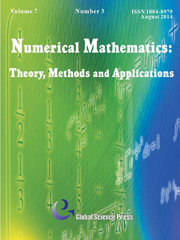Article contents
Mesh Spacing Estimates and Efficiency Considerations for Moving Mesh Systems
Published online by Cambridge University Press: 20 July 2016
Abstract
Adaptive numerical methods for solving partial differential equations (PDEs) that control the movement of grid points are called moving mesh methods. In this paper, these methods are examined in the case where a separate PDE, that depends on a monitor function, controls the behavior of the mesh. This results in a system of PDEs: one controlling the mesh and another solving the physical problem that is of interest. For a class of monitor functions resembling the arc length monitor, a trade off between computational efficiency in solving the moving mesh system and the accuracy level of the solution to the physical PDE is demonstrated. This accuracy is measured in the density of mesh points in the desired portion of the domain where the function has steep gradient. The balance of computational efficiency versus accuracy is illustrated numerically with both the arc length monitor and a monitor that minimizes certain interpolation errors. Physical solutions with steep gradients in small portions of their domain are considered for both the analysis and the computations.
MSC classification
Information
- Type
- Research Article
- Information
- Numerical Mathematics: Theory, Methods and Applications , Volume 9 , Issue 3 , August 2016 , pp. 432 - 450
- Copyright
- Copyright © Global-Science Press 2016
References
- 1
- Cited by

